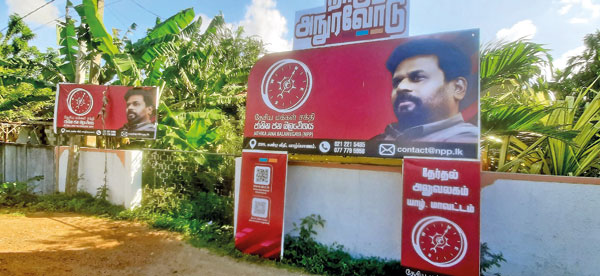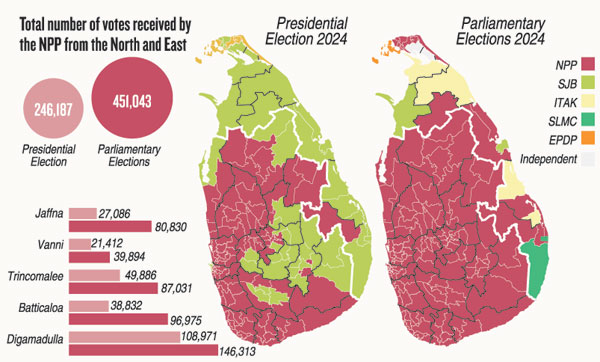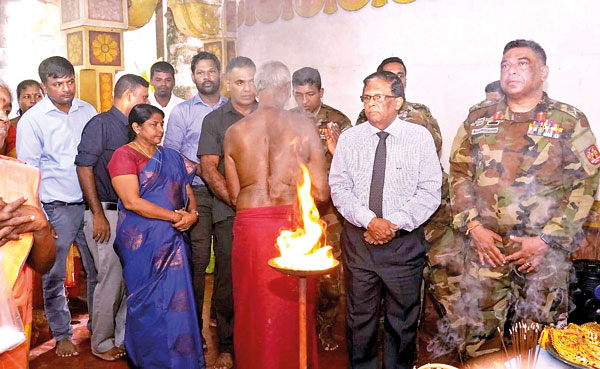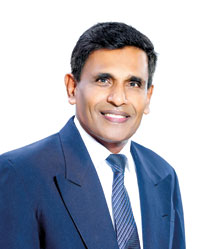- South-based party accurately gauges northern sentiment and secures victory
While north-based Tamil parties neglected the socio-economic issues of the people, especially the marginalised sections, the Sunday Times journalist S. Rubathesen analyses how the NPP made inroads into northern politics, first by sending its frontline soldiers—trade unionists—and then by establishing itself as a common people’s party.
ARIYALAI, Jaffna – In the outskirts of Jaffna city, the Janatha Vimukthi Peramuna (JVP) party office is located on A9 Road in what was once a house.
In front of its name board is a mega banner of the National Peoples’ Power (NPP)—an electoral alliance led by the JVP whose party machinery and unions reached out to communities from all walks of life in the northern region, including fisherfolk and farmers.

A JVP/NPP office in Jaffna
Though the party tried to establish itself in the region during the post-armed conflict period, it faced several difficulties, with the formerly influential Tamil nationalist parties re-emerging in the political arena with the defeat of the Liberation Tigers of Tamil Eelam (LTTE).
To carry out the political work and oversee its activities, the JVP sent its one-time parliamentarian Ramalingam Chandrasekar to the Northern Province. He spent significant time reaching out to the communities, identifying critical issues in fisheries and agriculture sectors, and commenting on social issues.
After 15 years, the JVP/NPP hit the jackpot. Disillusionment with the mainstream nationalist parties was growing. At last month’s parliamentary elections, the NPP, largely a South-based party, secured around one-fifth of the vote in the Northern and Eastern provinces, coming on top of the heap in all the districts in the two provinces with the solitary exception of Batticaloa.
Mr. Chandrsekar was rewarded with a cabinet post in the new JVP/NPP government. Entering Parliament through the National List, he holds the portfolio of Fisheries, Aquatic, and Ocean Resources.
Kayts Fishermen’s Cooperative Society president A. Annarasa told the Sunday Times that they warned Tamil parties of the growing support base of the NPP in the villages. “This was after some 25 fishermen’s unions sought our opinion about whom to support at the presidential election. We did not take a stand, but we knew whom they would support,” he said.
The North-based Tamil political parties were largely silent about critical livelihood issues the fisher communities were facing, particularly the unstoppable Indian bottom trawling in the northern waters, the illegal trawling by local fishermen, and long-term leasing of traditional fishing grounds to companies on the pretext of aquaculture development, Mr. Annarasa said, explaining the reasons for the JVP/NPP’s overwhelming victory in northern coastal electorates.

“And worse, they (the mainstream Tamil parties) looked down upon us always when we sought to raise our issues. They failed us completely, and fishermen had to look for someone elsewhere,” he said, stressing the point about local dynamics of caste and social issues in the region and how it affected the political representation of communities.
At the recent parliamentary polls, the NPP returned three seats from the Tamil nationalist stronghold of Jaffna and Kilinochchi district electorates—the first time in the history of post-independence Sri Lanka that a Southern political party has achieved such a feat.
At the September 21 presidential election, where the whole country was considered as one electorate, President Anura Kumara Dissanayake secured 27,086 votes in the Jaffna district, while at the November 14 parliamentary polls, the NPP swept the three seats with 80,830 votes.
The final NPP election rally ahead of the parliamentary polls in Passaiyoor, another coastal village in Jaffna, attended by President Anura Kumara Dissanayake, was the game-changer for many fisherfolk who were undecided.
During his speech, which was simultaneously interpreted, President Dissanayake vowed to protect Northern fisheries resources from long-time exploitation by foreign countries through illegal fishing methods following the end of the northern conflict in 2009.
“Several countries are engaged in illegal fishing in the Northern seas, robbing our marine resources. As a government, we will take all necessary steps to protect our marine resources and the rights of our fishermen,” the President assured the crowd.
He also touched on the northern electorates’ other key issues, such as long-time prisoners detained under the Prevention of Terrorism Act (PTA) and the release of military-occupied civilian lands in the peninsula.
Pointing out that past leaders from the South came to the North seeking votes while the NPP was committed to developing the whole country with the support of all the communities, President Dissanayake said, “They (Southern politicians) divided us on so many grounds to do politics. But currently, we are all together to develop the country.”
It was in 2019—amid the worst economic crisis that crippled the nation and the Aragalaya protests by people power movements in the heart of Colombo—that the JVP realised that it could capitalise on the daily struggles of the masses that the Tamil parties overlooked.
Influential trade unions such as the Sri Lanka Teachers Service Union, the NPP-affiliated Ceylon Electricity Board Service Union, and the Agrarian Services Union reached out to the people at the grassroots level across the Northern Province.
More than 6,000 teaching staff joined the Sri Lanka Teachers Service Union in the North, and it expanded its operations by setting up educational development cooperative societies in the northern districts. The union began granting small loans for its members at a low interest rate of six percent.
The Tamil nationalist political parties are still trying to recover from the shock and the electoral setback that forced them to initiate dialogues on unity.
The Ilankai Thamil Arasu Katchchi (ITAK), the one-time main constituent of the Tamil National Alliance (TNA), contested alone after an internal split and returned only eight seats in both the Northern and Eastern provinces.
At the 2020 parliamentary polls, the TNA won ten seats and emerged as the third major political group in Parliament.
Internal party conflicts, friction focused on more individuals than on policy, and disconnectivity at the grassroots level caused the alliance that dominated the northern politics to lose even some of its stronghold nationalist electorates in the province.
The ITAK won only the Batticaloa district—the only district that did not get caught in the NPP tsunami.
“We cannot dismiss the NPP waves that took a turn in the North, but our party vote bank is still intact,” said ITAK Jaffna district parliamentarian S. Shritharan, who has been elected as the party’s parliamentary group leader.
At the ITAK annual convention in June, he was elected party leader, but the decision was challenged in court. The matter is yet to be resolved.
“These intra-party issues, prioritising self-serving interests, taking the party to court, and targeting fellow candidates to tarnish their images by campaigning on allegations of securing liquor licences cost us deeply,” Mr. Shritharan said, explaining the setback for the party.
On Wednesday, the newly elected ITAK MPs led by Mr. Shritharan met President Dissanayake at the Presidential Secretariat. It was a formal meeting as MPs from the two provinces briefed the President on pressing issues, which the President assured he would look into.
“As our party’s mandate, we reiterate our stand of a federal solution for the ethnic conflict within the merged North and East. The President assured that it could be considered once the Constitution-making process is revived,” the ITAK leader said.
Apart from parliamentary group leader Shritharan, other MPs who took part in the meeting were Pathmanathan Sathiyalingam, Shanmugam Kugathasan, Shanakiyan Rasamanickam, Gnanamuthu Srineshan, Kaveenthiran Kodeeswaran, Elayathamby Srinath, and Thurairasa Raviharan.
The one-time TNA partners—the Tamil Eelam Liberation Organisation (TELO), the People’s Liberation Organisation of Tamil Eelam (PLOTE), and the Eelam People’s Revolutionary Liberation Front (EPRLF)—came up with their own electoral alliances but failed miserably, except for TELO leader Selvam Adaikalanathan, who got re-elected under the Democratic Tamil National Alliance (DTNA) banner in the Vanni district.
Those ITAK supporters who did not secure party nominations, including senior lawyer K. V. Thavarasa PC and Sasikala Raviraj, contested under separate alliances, further splitting the party’s vote base.
An initiative to field a common Tamil candidate at the recent September 21 presidential polls under the symbol of the ‘conch shell’ also split the Tamil nationalist vote bank as breakaway nationalist groups decided to use the same symbol to contest the parliamentary polls.
“Just like the people in the South voted against the elite and established parties, people in the North also extended their votes to express their disappointment in the Tamil parties,” Jaffna-based political analyst M. Nilanthan said.
Arguing that the Proportional Representation (PR) electoral system played a crucial role in returning three seats for the JVP/NPP, he pointed out that the vote bank of candidates who worked closely with the South or affiliated parties such as Douglas Devananda, Angajan Ramanathan, and Vijayakala Maheswaran shifted to the NPP significantly. Both Mr. Devananda and Mr. Ramanathan, who got the highest number of preferential votes in the 2020 parliamentary polls, failed to get re-elected at the November 14 polls.
“The NPP’s indirect stand against India by raising the poaching issue in the North and highlighting failures of the Tamil elite political leadership to address key social issues made this happen,” Mr. Nilanthan said, describing the NPP feat as a rare phenomenon. Utilising the ‘conch shell’ symbol to gain political advantage at the parliamentary polls also alienated our people further,” said the analyst, who was involved in the initiative for a Tamil common candidate.
Colombo-based senior Tamil journalist and political analyst V. Thanabalasingham said it was time for Tamil political leadership to indulge in some retrospection. “But I doubt they will do it. The voting pattern shows the desperate state of the Tamil people, who are disappointed with the political leadership since 2009 to undertake a sensible approach for the ethnic conflict that considers local and geopolitical dynamics,” he said.
Unlike in the South, where the NPP emerged as an alternative to the established political parties, there is no such political element in the North. Eventually, that vacuum was filled by the NPP, according to Mr. Thanabalasingham.
The trend against the mainstream parties was also reflected in the election of maverick candidate Dr. R. Archuna—a medical doctor by profession who came into prominence as a whistleblower with claims of medical corruption. He converted his public support, almost exclusively through social media, into votes.
Relying solely on social media platforms and funds from the diaspora, the controversial Chavakachcheri Base Hospital Medical Superintendent (MO) turned politician secured the highest number of votes, beating established political figures like former MP M.A. Sumanthiran and All Ceylon Tamil Congress leader Gajendrakumar Ponnambalam.
At least now, the Tamil political leadership should realise the grassroots realities and adopt a suitable strategy to secure the rights of the Tamil people rather than sticking to dogmatic-imaginative policies. Or else, it is unavoidable that people will join the national movements in the hope of securing their rights, Mr. Thanabalasingham said. Courtesy- The Sunday Times
Checkpoints disappear as Govt. reaches out to the North
Days after the November 14 parliamentary polls, there were visible signs of ‘change’ in the North, with several security checkpoints and roadblocks that were placed by the armed forces in the past being either removed completely or minimised.Among them, the removal of the major checkpoint at Elephant Pass along the A9 Road was significant as it continued to exist even after the end of the separatist insurgency, given its critical location as the gateway to the Jaffna peninsula from the mainland.The checkpoint, along with roadblocks manned by military and police personnel, was withdrawn and converted to a police post with a limited number of personnel on duty.A similar roadblock in Eluthumadduval was also removed.
Along with the removal of checkpoints and roadblocks, the security forces are also releasing private lands in their control after an evaluation process without compromising national security.
The army vacated a camp built on private land in Katkovalam, Point Pedro, after nearly three decades, a week after the elections. The three-acre extent of private land, owned by three brothers, had been under military occupation since 1995 when the armed conflict in the North intensified.

Northern Governor N. Vedhanayahan took part in Hindu pooja celebrations held at the Sri Rajeswary Amman temple in a recently released area in Palaly on Wednesday. The Army's outgoing Commander in charge of Jaffna security, Maj Gen Chandana Wickremesinghe also attended the event.
Following the directive issued by Army Headquarters to vacate the private property within 14 days, troops moved its resources to a nearby base camp.
Earlier, residents and landowners opposed attempts by the authorities to acquire land through legal measures. They staged protests in front of the army camp.
However, a counter-protest was also staged by a group of residents against the removal of the camp, arguing it would lead to more sand mining and other anti-social activities in the area.
A key access road in the one-time High-Security Zone (HSZ) at Tellipalai in Kankesanthurai (KKS) was also released for public use on November 1 after 34 years following a directive from President Anura Kumara Dissanayake.
The 1.25-kilometre-long access road connects Palaly Road-Vayavilan Junction with Tholakatty Junction in Jaffna. The road was initially closed due to the prolonged armed conflict and remained inaccessible even after the end of the war for 15 more years.
Residents had long called for the road’s reopening to facilitate greater mobility and regional development. Their concerns were formally raised in a discussion on October 22 with Northern Governor Nagalingam Vethanayahan, who appealed directly to the President for action.
Accordingly, President Dissanayake informed the armed forces to evaluate the security concerns over the opening of this road and to take necessary action. With the intervention of the Ministry of Defence and the Defence Secretary, steps were taken to open this road, a statement from the Presidential Secretariat said.
In another development, the north and east saw red and yellow flags symbolising Tamil nationalism, ahead of the annual commemoration of Maveerar Naal, or Heroes’ Day, at the public remembrance spaces and dedicated cemeteries where fallen cadres of the Liberation Tigers of Tamil Eelam (LTTE) remained buried.
The leftover tombstones at the LTTE-built cemeteries, after they were destroyed, were gathered by relatives of the fallen cadres to remember their loved ones on November 27.
Unlike in recent years when police sought court orders against such mass-collective commemoration events, this time, the mourners were allowed to commemorate their dead peacefully.
However, the police warned earlier that commemorating a banned terrorist organisation through imagery or symbols is a punishable offence and requested the public to refrain from such incidents.
Thousands of people turned up on November 27 to commemorate their loved ones at ceremonies held at the University of Jaffna, public spaces, and memorials in partially destroyed LTTE cemeteries.Organized by war-affected communities, civil groups, and youth wings at grassroot level, the organizers collectively decided not to give any priority basis for any politicians on the podium whereas parents of fallen cadres lit oil lamps to commence the collective event.
Taking advantage of the situation, former parliamentarian M.K. Sivajilingam and his supporters organised a cake-cutting ceremony on November 26 – the birthday of the defeated LTTE leader V. Prabhakaran at his ancestral house in Valvettithurai. A banner on the concrete fence of the house featured the image of the LTTE leader. Police personnel took immediate measures to hide the image from the banner.
Earlier this week, police teams recorded statements from the former MP and others who took part in the ceremony and further investigations are underway over the incident.
Public Security Minister sees organised effort to cause discord among communities
The Criminal Investigations Department (CID) is probing the incidents where LTTE symbols had been used in Maveerar Day events to remember those who died in the 30-year conflict.Public Security Minister Ananda Wijepala said a report had been sought from the acting Police Chief Priyantha Weerasuriya.He said that although there had been no major commemorative events, the CID would look into the motive behind the display of LTTE symbols at some events.

Public Security Minister Ananda Wijepala
Addressing Parliament on Wednesday, he made a detailed statement about the events that had taken place in the north on Maveerar Day, November 27. Excerpts from the speech:
“As I stated in this parliament yesterday, as the Minister of Public Security, I am planning to provide an explanation about the several arrests made during the past few days as well as the background causes that led to the arrests.
“First I would like to tell the parliament that National People’s Power (NPP) during the parliamentary election obtained a public verdict against racism. The public opinion we received is also a mandate given to us to work towards national peace. When we checked the results of the election, we could observe that the people in both the north and the south, as Sri Lankans, had set aside race and religious differences and given their mandate.
“The NPP is a political movement that was always against racism and religious extremism. That is why we were capable of representing all the people across all religions and nationalities and obtaining a majority of votes. Therefore I would like to stress that the mandate that we obtained was against racism.
“During the past few days, the people had been talking about celebrations of the Mahaviru day; our position regarding that was that we admit that people have the right to commemorate their dead relatives. We stand by this position, regardless of whether the person is from the North or the South. A person living in the Northern Province has the right to remember a deceased child or a relative. Yet as the LTTE is a banned organisation, there is no space to carry out Mahaviru celebrations by exhibiting flags, symbols, and motifs of that organisation.
“During the Mahaviru week extending from November 21 to 27, there were 244 (mahaviru) events held, according to police. Only in ten of these celebrations were LTTE symbols displayed.
The police have implemented the law and taken the necessary steps, and accordingly, evidence has been submitted to the Kilinochchi magistrate’s court regarding two incidents, and to the Point Pedro magistrate’s court regarding four incidents. Action has been filed in the Jaffna Magistrate’s Courts regarding one incident. Investigations are continuing on the matter.
“Accordingly, in the Chunnakam area, a person was arrested for promoting the LTTE and produced in the Jaffna magistrate’s court. He was remanded till December 04, 2024.
“Regarding these ceremonies held in the north, some people in the south have utilised social media to carry out various campaigns in recent days. Among them were some who spread false information and made distorted statements. Maliciously and deliberately created statements were circulated.
In those social media campaigns, we could observe posts that would imply that the Mahaviru celebrations were allowed to be held in the north this year, yet some of those pictures used were of events held in 2018 and 2022. Those old pictures were used in social media to imply those were the ceremonies held in 2024.

“I have all those pictures with me. Some of these pictures and videos have been downloaded via the internet, and some of these pictures were of ceremonies held in foreign countries. None of them was of the ceremonies held this year in the Northern and Eastern provinces.
“Some groups leading the social media campaign from the south were downloading pictures of ceremonies held in foreign countries, where events had LTTE symbols exhibited, to create a false impression that the pictures were of the ceremonies in the north and deliberately and in an organised manner to create discord between different communities.
“There were no reports received that any of these events mentioned in social media had been held in the north; the pictures and video footage reveal that they were of events held in another country during a different year.
“However, some people are trying to give the impression to society that these events were held after Anura Kumara Dissanayake took office. There were some LTTE ceremonies in the north. We paid attention to that matter and acted on it.
“We studied the social media campaign and found that an organised group that is politically bankrupt was behind it. The police took action against them for spreading false information. At the moment, a few people have been arrested. One person is from the north. Apart from that, a person residing at Baddegama was arrested on November 29 under the above-mentioned charges and produced before the Baddegama magistrate. The suspect was remanded until Tuesday, December 03, and was re-remanded until December 17…
“Apart from that, a person residing at Maradana was arrested on similar charges. On his Facebook account, he had used pictures obtained from Facebook to give the impression that these events were held in the north. The suspect had acted in a manner that misled the people, aggravated racism, and created discord among the people. Therefore, he was arrested on November 30, produced before the courts, and remanded until December 2, and later granted bail.
Another resident at Boralesgamuwa under the same allegations was arrested on December 01. After producing before the Colombo magistrate, he was remanded till December 04. This suspect, a political activist, had contested the parliamentary elections under the cylinder symbol. Among the suspects arrested, two politicians supported the cylinder symbol.

Post a Comment